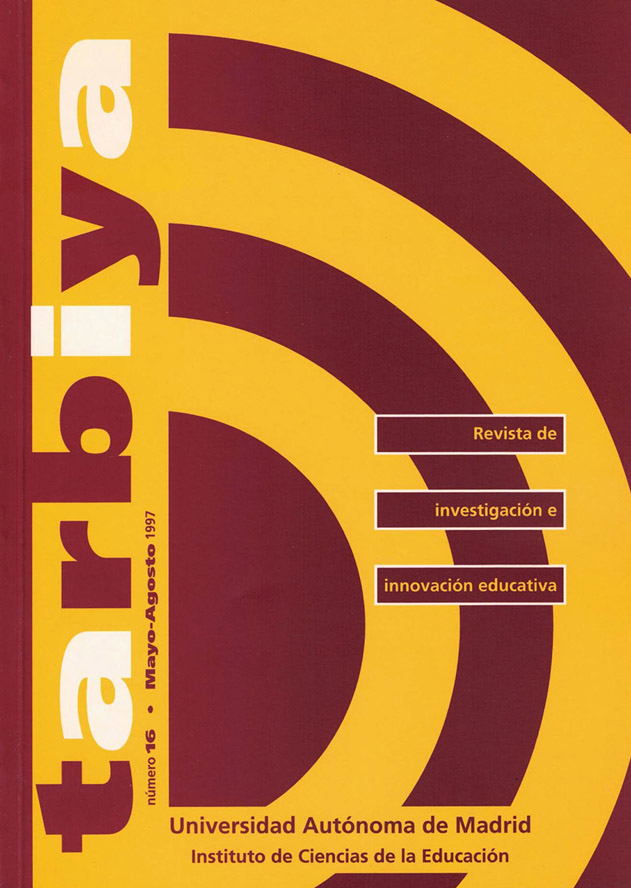The study of the most representative scripts in the three social motives: a pilot study on popular beliefs in motivation
Keywords:
Achievement motive, Affiliation motive, Power motive, Motivatonal scriptsAbstract
With this study we intend to initiate a line of research about the prototypical scripts in the three social motives, that is, achievement motive, affiliation motive and power motive. All this based upon one analysis of subjects reports. Through the results aliready obtained we could draw some conclusions about the similarity between features of prototypical motivational scripts, as they are reported by subjects, and those postulated by motivational theories.
This study is the first on a series of studies in whicb we are working about tbe motivational script of achievement which, as it is known, is closely related to learning.
Downloads
References
AMES, C. (1992). Classrooms: Goals, structures and student motivation. Journal Educational Psychology, 84, 3, 261-271.
DECI, E.L. y RYAN, R.M. (1991). A motivational approach to self: Integration in personality. En R. Dienstbier (De.): Nebraska Symposium on Motivation. Perspectives on Motivation. (Vol. 38). Lincoln: University of Nebraska Press.
DWECK, C. y ELLIOT, D.S. (1983). «Achievement motivation». En P.H. Mussen (gen. ed.) y E.M. Hetherington (vol. ed.): Handbook of child psychology. Vol. IV. Social and Personality development (pp. 643-691). Nueva York: Wiley.
EMMONS, R.A. (1989). The personal strivings approach to personality. En L.A. Pervin, Goal concepts in personality and social psychology. Hillsdale, NJ: Erlbaum.
FERNÁNDEZ DOLS, J.M. (1990). Perspectivas psicosociales en emociones. En G. Serrano (Org). Libro de ponencias. III Congreso Nacional de Psicología Social. Santiago de Compostela: Departamento de Psicología Social y Básica y Sociedad Galega de Psicología Social.
HUERTAS, J.A. y MONTERO, I. (1995). Un estudio histórico y crítico de las perspectivas teóricas actuales sobre la motivación humana. Revista de Historia de la Psicología, 16 (3-4), 91-101.
HUERTAS,J.A. (1997). Motivación. Querer aprender. Buenos Aires: Aique.
HUERTAS, J.A. y RODRÍGUEZ MONEO, M. (1997). El control consciente de la motivación. Las confusas relaciones entre pensamientos y deseos. En J.A. Huertas. Motivación. Querer aprender. Buenos Aires: Aique.
HUERTAS,J.A., MONTERO, I y ALONSO TAPIA, J. (1997). Principios para la intervención en el aula. En J.A. Huertas. Motivación. Querer aprender. Buenos Aires: Aique.
LOCKE, E., SHAW, K.N., SAARI, L.M. y LATHAM, G.P. (1981). Goal setting and task performance: 1969-1980. Psychological Bulletin, 89, 125-152.
MCADAMDS, D.P. (1980). A thematic coding system for the intimacy motive. Journal of Research in Personality, 14, 413-432.
MCCLELLAND, D.C. (1985). Human Motivation. N.Y.: Scott Foresman. Traducción española: Estudios de la motivación humana. Madrid: Narcea, 1992.
MONTERO, I. y HUERTAS, J.A. (en prensa). Desarrollo y motivación en el análisis del habla infantil en contexto escolar. Comunicación, cultura y educación.
PÁEZ, D. y ECHEVARRÍA, A. (1989). Emociones: perspectivas psicosociales. Madrid: Fundamentos.
PÁEZ, D., VERGARA, A., ACHUCARRO, C. e IGARTUA, J. (1992). Factores psicosociales y conocimiento prototípico de las emociones. Introducción a una defensa de la perspectiva de los prototipos para los conceptos emocionales. Revista de Psicología Social, 7 (1), 63-73.
PÁEZ, D. y VERGARA, A. (1992). Conocimiento social de las emociones: Evaluación de la relevancia teórica y empírica de los conceptos prototípicos de cólera, alegría, miedo y tristeza. Cognitiva. Vol. 4, 1, 29-48.
PARROT, W.G. (1992). Conceptos de emoción en la teoría y en la vida cotidiana. Revista de Psicología Social, 7(1), 115-123.
PENNEBAKER, J.W. (1982). The Psychology of Physical Sympoms. New York. Springer Veriag.
PINTRICH, P.R. y SCHUNK, D.H. (1996). Motivation in Education: Theoric, Research, and Applications. Nueva-Jersey: Prentice-Hall, Inc.
RUSSELL, J.A. (1991). Culture and categorization of emotions. Psychological Bulletin, 110, 426-450.
RUSSELL, J.A. (1992). En defensa de una aproximación a los conceptos emocionales desde la perspectiva de los prototipos. Revista de Psicología Social, 7 (1), 75-95.
SARBIN, T. (1986). Emotion and act: Roles and rhetoric. En R. Harre. The Social Construction of Emotions. New York. B. Blackwell.
SCHANK, R.C. y ABELSON, R.P. (1977). Scripts, Plans, Goals and Understanding. An Inquiry Into Human Knowledge Structures: Nueva Jersey: LEA.
SCHUNK, D.H. y MEECE, J.L. (Eds.) (1992). Student perception in the classroom. Hillsdale, N.J.: LEA.
SMITH, C.P., ATKINSON, J.W., MCCLELLAND, D.C. y VEROFF, J. (1992). Motivation and Personality. Cambridge: Cambridge University Press.
WEINER, B. (1992). Human Motivation. Metaphors, Theories, and Research. California: Sage.
WERTSCH, J. (1985). Vigostky y la formación social de la mente. Barcelona: Paidós.

